
Posts Tagged ‘peace’
Error and forgiveness
From a scientific point of view, finding errors in methods and analyzes means changing the route and not the research hypothesis, if a hypothesis is not confirmed this is a result and not an error, in fact for Popper this is how science walks, but another thinker Thomas Kuhn argues that there are ruptures or new research hypotheses, quantum physics is an example of this.
methods and analyzes means changing the route and not the research hypothesis, if a hypothesis is not confirmed this is a result and not an error, in fact for Popper this is how science walks, but another thinker Thomas Kuhn argues that there are ruptures or new research hypotheses, quantum physics is an example of this.
Already in philosophy, most philosophers defend that forgiveness is a moral virtue, thus it expresses the human capacity to overcome resentment and revenge, and with this restore interpersonal and social relationships, but there are philosophers who see forgiveness as weakness or illusion, since it denies the seriousness of the evil and the responsibility of the offender.
The contemporary philosopher who dealt with forgiveness was Paul Ricoeur, who developed it without departing from the religious sense (mainly Christian) and sees it as a paradox, as it goes against the unforgivable, that is, that which cannot be repaired or compensated by justice.
The theme is relevant because Ricoeur recalls that the theme became relevant “particularly characteristic of the post-Cold War period, in which so many peoples were submitted to the difficult test of integration of traumatic memories” in a text published in Esprit, no 210 (1995) , pp. 77-82 and which can be found on the Internet or part of the Ricoeur book (1967).
The author places “forgiveness in the energetic action of a work that begins in the region of memory and continues in the region of oblivion” (Ricoeur, 1995), and that a phenomenon “that can be observed on the scale of common consciousness, of memory shared” and clarifies that he wants to avoid the debatable notation of “collective memory”.
Although written well before our time, as much the totalitarian question is at stake as the question of colonialism, and this means a “shared” memory that can lead to fury.
The philosopher uses the vocabulary of the German philosopher R. Roselleck, who opposes “our global historical consciousness”, which he calls the “space of experience” and, on the other hand, the “horizon of waiting”, if we look at our experience almost we can overcome hatred and resentment between peoples and cultures, so I consider it correct not to use “collective memory”.
It is necessary to overcome historical errors, misconceptions and paths already trodden, which led us to chaos.
Ricoeur, P. (1967) Symbolism of Evil, Harper & Row Pub, New York: USA. (pdf).
Dangers of expanding war
While on the front of Russia and Ukraine the danger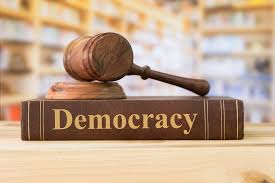 that the war will spread to all continents is more and more real, the coup d’état in Niger, in the sub-Saharan region that already has other conflicts and ruptures with democracy, is at the limit and the nations themselves African women threaten to intervene.
that the war will spread to all continents is more and more real, the coup d’état in Niger, in the sub-Saharan region that already has other conflicts and ruptures with democracy, is at the limit and the nations themselves African women threaten to intervene.
This region, where Chad, Mali and Niger are located, is one of the poorest regions in the world with high rates of infant mortality, illiteracy and low life expectancy, however the wealth of minerals attracts interest in these countries of Russia and France .
The leaders of the Economic Community of West African States (ECOWAS) have approved the military intervention in Niger, as the recently democratically elected president Mohmed Bazoum has been ousted and is under house arrest.
At the meeting, President of Côte d’Ivoire, Alassane Quattarao stated that the intention is for the military operation to begin “as soon as possible” so we will have a new war front on another continent, while the climate between South and North Korea increases tension in the east.
In Argentina and Ecuador, during the electoral period tensions increase, the Argentine surprise was the victory of the anarcho-capitalist Javier Milei of Libertad Avanza, while within the proposal Juntos por el Cambio, of Macrista tendency (ex-president Macri) Patricia Bulrrich of the Proposal Republican won Hora Rodrigues Larreta, there is still the candidate Sergio Massa, government economist, with little chance for the economic ruin of Argentina.
In Argentina, analysts estimate that the economic decline has made society bet on new proposals, with the risk that new things always carry, it is not clear what they will do, the elections will take place on October 22nd.
In Ecuador, the death by assassination of the candidate Fernando Villavicencio, of the Construye Movement, shows the action of paramilitary groups in politics, this Sunday (13) the movement announced the new candidate Christian Zurita, but tensions of political violence continue.
It is necessary to relaunch the principle of self-determination of peoples, respect for sovereignty and democracy in countries and limit military interventions and their actions in the field of politics.
New holodomor and the war
While there are expectations of new 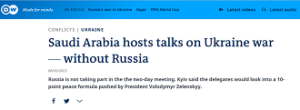 meetings for peace with Jeddah in Saudi Arabia, the perspectives of a greater involvement of other countries in the war grow with the danger of a war on a global scale.
meetings for peace with Jeddah in Saudi Arabia, the perspectives of a greater involvement of other countries in the war grow with the danger of a war on a global scale.
In the harsh period of the former Soviet Union, there had already been a conflict between the Russian Soviet Republic and the Ukrainian Soviet Republic, the holodomor in 1931-32, in which the dictator Joseph Stalin confiscated Ukrainian production, killing a large number of Ukrainians from starvation, there is a book on the subject (pdf), the ukrainians managed many years after declaring this episode of their national life as a genocide.
Russia had already undermined Ukraine’s supply sources, now it systematically bombs ports and grain storage sites and spreads mines across the borders of the conquered territory, the Ukrainian economy already in ruins, now suffers a hard blow and with that there are a threat to world grain supplies.
The internal battlefront remains tough, with small advances in the counteroffensive, but the pole is now moving towards the Black Sea, where grain export ships can be hit and already a provocation with Poland, by the Wagner group that is in Belarus .
Some discourses and narratives hide the horrors of war, death of civilians, distribution and disasters in rivers and energy sources, and violation of war treaties, with mutilation and torture of prisoners, and use of weapons of war prohibited by international agreements such as, land mines, white phosphorus bombs and cluster bombs.
An involvement of Poland and Belarus, would be the first scale of a world war, reminiscent of the invasion of Germany in 1st. of September 1939, which was the trigger for the involvement of several countries, the first to declare war were England and France.
The political and financial involvement of other countries is already practically declared, with forces alongside Ukraine and Russia, but common sense still makes some countries and more cautious diplomats think about the disaster for the economy in addition to the serious danger of using nuclear force.
The forces for peace have started a conference of senior officials from around 40 countries, including the US, China, South Africa and India and are taking part in the discussions in the coastal city of Jeddah, on the Red Sea, being European newscasters, including the German DW (Deutsch Welle), without the participation of Russia.
.
Conflict rages and hope for peace
The combat front extends across the entire 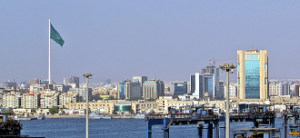 eastern region of Ukraine, which claims advances, while Russia is again bombing the ports of grain stocks in Ukraine, which threatens the food security of several countries.
eastern region of Ukraine, which claims advances, while Russia is again bombing the ports of grain stocks in Ukraine, which threatens the food security of several countries.
Putin promises to deliver grain “for free” to several African countries, but South Africa warns it is not enough, and Niger has had a Russian-backed coup d’état, and President Hohamed Bazoum is jailed, while General Abdourahamane Tchiani has taken over. the country, the European EU cut all support given to the country, with France having interests in the country’s business.
The Wagner group of mercenaries from Russia operated in the region, having influenced the positions of Mali and currently influence Burkina Faso, the group is currently in Belarus and raises fears of Poland that it could cause a conflict in the region, expanding the war zone and reaching NATO’s “weak points”.
Mali and Burkina Faso are among the poorest countries in the world and dependent on foreign aid, both for food security and military, they are predominantly agricultural countries.
Hope comes from Saudi Arabia, which will host a meeting in the city of Jeddah to address the situation of the war in Ukraine, in addition to Brazil and India, which are members of the Brics, the United Kingdom, Poland and South Africa are among countries that confirmed their attendance, Egypt, Indonesia, Mexico, Chile and Zambia are among the guests, US Security Secretary Jake Sullivan is expected to attend the meeting and Putin will not attend.
The meeting is important because there were accusations to the OPEC+ group, on October 22, that oil producing countries are supporting Russia, however the bloc, along with other countries invited to the meeting, maintains a firm position of expanding peace talks.
The meeting to attempt a peace agreement in Ukraine will take place on the 6th and 7th of August, while the Brics will have a meeting on the 22nd to the 24th of August and China proposes the inclusion of Saudi Arabia and Indonesia in the group, while Brazil and India resist the idea, Putin should not participate.
Jeddah (or Giddah) (photo) is located on the edge of the Red Sea, is a UNESCO World Heritage Site, has 23 sister cities, including Rio de Janeiro in Brazil, Odessa in Ukraine, Kazan and Saint Petersburg in Russia, and its main twinning (another sister city concept) is with Miami of the US.
Food security and escalation of war
The end of the grain agreement prevents  shipments of grains produced in Ukraine, in particular: wheat, corn and barley, with this wheat has already risen 8.5% on international exchanges and corn 3.5%, as this bombing in Odessa which is still a free port of Ukraine, which is at the western tip of Ukraine on the Black Sea.
shipments of grains produced in Ukraine, in particular: wheat, corn and barley, with this wheat has already risen 8.5% on international exchanges and corn 3.5%, as this bombing in Odessa which is still a free port of Ukraine, which is at the western tip of Ukraine on the Black Sea.
Ukraine has received constant attacks on its ports and warehouses in Odessa, in response it carries out bombings on weapons and supply warehouses in Crimea and the Kersh bridge in the strait of the same name that connects Crimea to Russia was hit again. (in the photo the cathedral of Odessa hit this Sunday)
On the northern front there are no major advances in the counteroffensive and Russian propaganda says that its forces have advanced, while the Ukrainian forces admit only a small and slow advance, far below expectations, while waiting for more weapons and ammunition.
The number of Russian soldiers and forces has increased, but it is in the air battle that it has the greatest power, and the end result is that on all fronts the war escalates.
Hungary, Austria and this week Bulgaria have sent weapons to Ukraine and Russia’s tension with Poland is at an all-time high through Belarus, which shares a border with Poland.
The Brics held their meeting without the presence of Russia, which is a relief for the group, but this does not mean a break with the group, China is increasingly a Russian ally, Brazil and South Africa are hesitating on the subject, while India tries to reinforce its calls for peace.
A loss in world grain distribution will hit Latin America and much of Africa hard, whose leaders have also unsuccessfully tried to put pressure on Putin.
Russia and China have returned to military exercises in the Sea of Japan, as a result of which South Korea and Japan are becoming increasingly close to Western forces and NATO.
The right question about evil
There is no doubt that there is cruelty, evil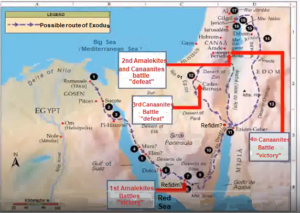 and indifference which is the great contemporary evil, but it is neither Manichaeism nor pure evil incarnate.
and indifference which is the great contemporary evil, but it is neither Manichaeism nor pure evil incarnate.
Always at all times agreements and wars were tried, often just for convenience or even war tactics, we have already posted about bad post-war agreements, such as Germany that came out humiliated from the first world war and we learned little from history.
We are making the route of the Jewish-Sumerian people until they get back to Canaan, where they left due to hunger to go to Egypt, before leaving Moses receives the divine message to address the Pharaoh, he goes with his brother Aaron, but what is the point knowing that the Pharaoh is merciless with the Israelite people? It’s just that the true divine message is always good seed for all peoples, that’s why the parable of the good seed, which should be the name of the parable of the tares and wheat.
Even going to talk to the pharaoh, the Israelites will be pursued, and then they will have to fight 4 battles in the flight through the desert, the battle of Rephidim where the marauding Amalekites win, the second again against Amalekites and Canaanites (so the location of Rephidim may be further north), the third a defeat against Canaanites and the 4th. the final victory.
See the reading (Mt 13,26,27): “When the wheat grew and the ears began to form, the weeds also appeared. The employees went looking for the owner and said to him, ‘ Lord, didn’t you sow good seed in your field? So where did the weeds come from?’ and the manager says not to uproot the weeds because it might uproot the wheat with it.
The divine seed is always good, but tares will always grow among the wheat and only from there can we correctly interpret the seed that falls on bad soil and among thorns and does not flower or bear fruit.
There is always hope and always a possibility for peace and harmony among nations and peoples.
The people get tired and don’t believe anymore
The return to the land of the tribes of Israel will not be easy, but it is to escape the oppression of Egypt, a nation that will face the famous “plagues of Egypt”, which are biblical, but also historical: the plague, war and decay and the famine, common episodes in the declines of empires.
will not be easy, but it is to escape the oppression of Egypt, a nation that will face the famous “plagues of Egypt”, which are biblical, but also historical: the plague, war and decay and the famine, common episodes in the declines of empires.
The passage from the Exodus narrative reads (Ex 3:17): “And I decided to bring you out of the oppression of Egypt and to lead you into the land of the Canaanites, the Hittites, the Amorites, the Perizzites, the Hivites, and the Jebusites, to one land flowing with milk and honey”, we see on the map what Canaan was like at the time.
The long journey and the scarcity of food, they ate a fallen food that they called manna and there was also a lack of water, in a place called Massa and Meriba, where the people begin to argue and “try the Lord” questioning: Is the Lord in the among us or not?
That’s when Moses will go looking for water in a prophetic inspiration.
There Moses manages to “smite the rock”, somehow shatters a rock on the mountain and finds water, but then comes the battle with the marauding Amalekites (Exodus 17:1-16), although literature indicates Horeb’s proximity to the south, the site was probably farther north, because the site of the Rephidim Battle (meaning resting place) must be farther north, at the head of the Red Sea, near Mount Sinai (Exodus 15:17-22).
During battle Moses must keep his staff raised. However, with his advanced age, his arm starts to bend, and it is necessary to support his arm so that the Israelites win the battle.
So many times these wars happened, history says that the first of them was the battle between Sumerians and Umma (around 2700 BC), the wars of Egypt, then came the Persians and the famous Punic (Greek) wars, the Roman empire , medieval battles, the Hundred Years’ War and the two world wars, the minor wars of empires and colonies.
If we learned not only from written histories, but also from worldviews (those that established the cycles: plague, war and famine) and really believed in a possibility of universal peace, not the pax Romana which is submission to an empire, respecting cultures and peoples of different races and creeds, a true civilizing process could be built.
The idea that those who want peace prepare for war is not humanitarian and still haunts the minds of men and leaders with a thirst for power
The Burning Bush Episode
The story of the departure of the Israeli people from Egypt begins with an extraordinary event in which Moses leads Jethro’s flock, I am father-in-law and priest of Midian (history records him as a Druze) and near Mount Horeb he sees a burning bush that does not consumes it (Ex 3,3): “I am going to approach this extraordinary sight, to see why the bush does not consume”.
from Egypt begins with an extraordinary event in which Moses leads Jethro’s flock, I am father-in-law and priest of Midian (history records him as a Druze) and near Mount Horeb he sees a burning bush that does not consumes it (Ex 3,3): “I am going to approach this extraordinary sight, to see why the bush does not consume”.
There he receives the mission to remove his people from Egypt and the episode of the Escape from Egypt will begin, just as Abraham had withdrawn from an unlikely path from Ur of the Chaldeans, Moses will also make a route going through the region of Midian, in the biblical narrative this people it is also of Abrahamic origin since Abraham after Sarah’s death had Midian or Madian with his wife Keturah.
The historical record of the plagues of Egypt that preceded the flight can be found in the “Ipuwer papyrus” discovered in Egypt at the beginning of the last century, and taken to the Leiden museum in Holland, it was deciphered by A. H. Gardiner, and was found near the city of Avaris.
The Israelites at the beginning of the persecution are established in the warehouses of Rameses and Pitom, then they begin to migrate to Sucode, and from there they begin the flight to the Sinai desert, it will be in Horeb where Moses saw the burning bush that will receive the tablet of the law, the Ten commandments.
Jetro’s connection with the Midianites, he was a priest, is fundamental in the logistical support for the fleeing caravan, and this is probably the reason that they took a longer route, and we see from the map that it is likely that at the end of the persecution there will be a new one. miraculous episode that is the passage to be dried by the Sea.
The following story of the people will speak of many connections with the Moabites (Ruth was a Moabite and Lot would have given rise to the people through incest with his daughter) they lived in the desert so the road to Canaan will be even longer, the Egyptians still dominated the region, what was to be accomplished in days says the narrative that took 40 years.
In the history of that region, troglodytes lived, not in the folkloric sense that we know, but the fact that they lived in caves and houses dug in the mountains, as was also characteristic of the north in the well-known Cappadocia, region of so many mystics of antiquity.
Persecution and emigration always affected nations in wars.
The peace that few desire
While bloody battles unfold without major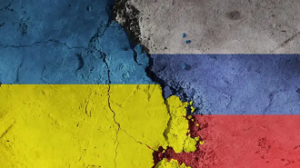 advances in the Ukrainian counter-offensive, from side to side, one can see what the war produces: the lack of principles and a growing hatred between the parties involved, which today few countries escape.
advances in the Ukrainian counter-offensive, from side to side, one can see what the war produces: the lack of principles and a growing hatred between the parties involved, which today few countries escape.
On the Russian side, inhumanity towards the troops themselves grows, General Ivan Popov, commander of the 58th. Combined Arms Army, which operates on the Zaporizhzhia combat front, was dismissed by Minister Sergei Shoigu for accusing him of treason and little support for troops in combat, other generals are also away or “resting”.
This is certainly not counterpropaganda, as the mercenary leader also accused him of the same things, and said that troops are being killed for little logistical support.
On the Ukrainian side, after the NATO meeting on July 12th, there is a clear sign for Sweden’s entry into the bloc, we remember that neighboring Finland is already there, as for NATO, it only continues to support and promise future membership, however the minister of England declared that Zelensky should show more gratitude, Zelensky reacted by asking his defense minister who was in the audience if he has good relations with the British Ben Wallace, and then asked him to make a call to him.
What is worrying on the Ukrainian side is the delivery of cluster bombs that are prohibited in international agreements, and that the US proposes to supply to the ally.
Either because of ideological and economic interests, or because they do not believe in an escalation of a third world war, which would be the greatest civilizational disaster of humanity, there is little desire and commitment for peace, some countries and leadership that tried failed to be resilient to the decision and it shows that they, too, have a vested interest in this war.
Sincere and true humanists cannot wish that the escalation of this war continues, and it is not “another war” since it involves heavy interests and threats.
The sale of Joseph, son of Jacob
The story of Esau and Jacob continues in the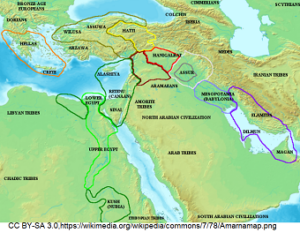 next generation, among the children of Jacob, now Ishmael after he fought with the angel, Joseph was the most loved, which generated envy in the brothers who planned to kill him but later decided to sell him to an Egyptian caravan to a caravan leader named Potiphar, but Joseph in Egypt becomes a prisoner because Potiphar’s wife was fond of him and trapped him for refusing to betray her teachings.
next generation, among the children of Jacob, now Ishmael after he fought with the angel, Joseph was the most loved, which generated envy in the brothers who planned to kill him but later decided to sell him to an Egyptian caravan to a caravan leader named Potiphar, but Joseph in Egypt becomes a prisoner because Potiphar’s wife was fond of him and trapped him for refusing to betray her teachings.
In prison he manages to unravel the dreams of a prisoner who was chief cupbearer and says he will be released and becomes cupbearer in the Pharaoh’s palace who also has strange dreams, and then the cupbearer remembers Joseph and he unravels the dream of the Pharaoh that was to store food (in the photo as was the map of this period).
Joseph’s brothers go to Egypt due to the shortage of food and they encounter Joseph, who recognizes them and sends them to prison, but ends up forgiving them and provides the wheat they need and says that everything happened so that he could help them
In a work of 4 volumes, the famous writer Thomas Mann (author of The Magic Mountain) wrote the story of Joseph, son of Jacob who is sold by his brothers, out of envy, as a slave to the Egyptians for 20 pieces of silver, the historical question of coins is important because they would only appear later, however gold and silver were already used in the barter business.
Thomas Mann’s work was written mainly to fight the Hitlerism that was growing in his country, it was not just about fighting against anti-Semitism, but mainly he perceived a growing authoritarian discourse present in Germany at his time.
Also the Brazilian Oscar Pilagallo in his book “The Adventure of Money” cites Thomas Mann and also Faust by Goethe in his work, and with this he tells the story of José.
In the context we have developed, the evolution of the noosphere, the importance of Thomas Mann’s text is that he manages to understand the Babylonian influence on Jewish tales, as well as after the Exile in Egypt they will also suffer influences, and later on from the Greeks and Romans.
The lesson we can learn from Joseph of Egypt is that God took a greater good out of an evil and redeemed Joseph’s brothers despite the crime they committed, the biblical story is not for those who think of revenge or hate, it is pure love the humanity.

